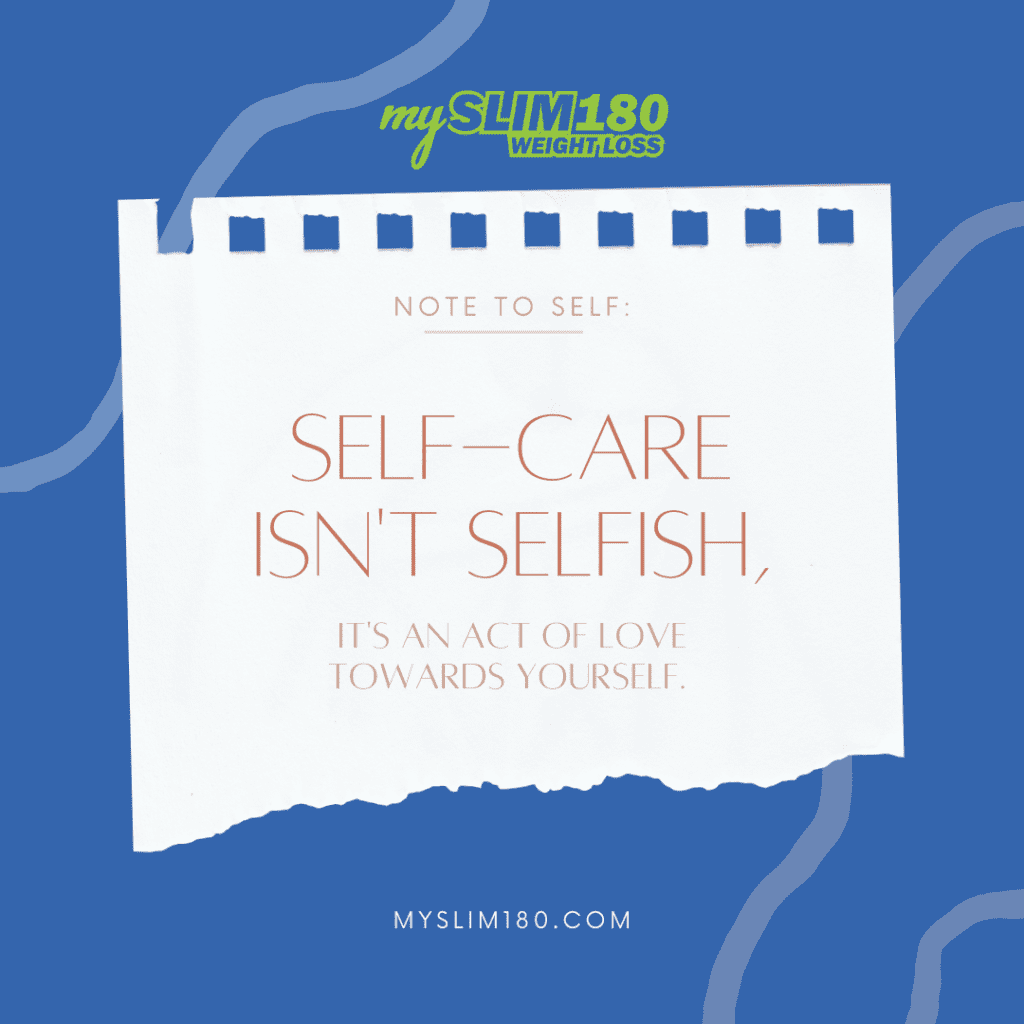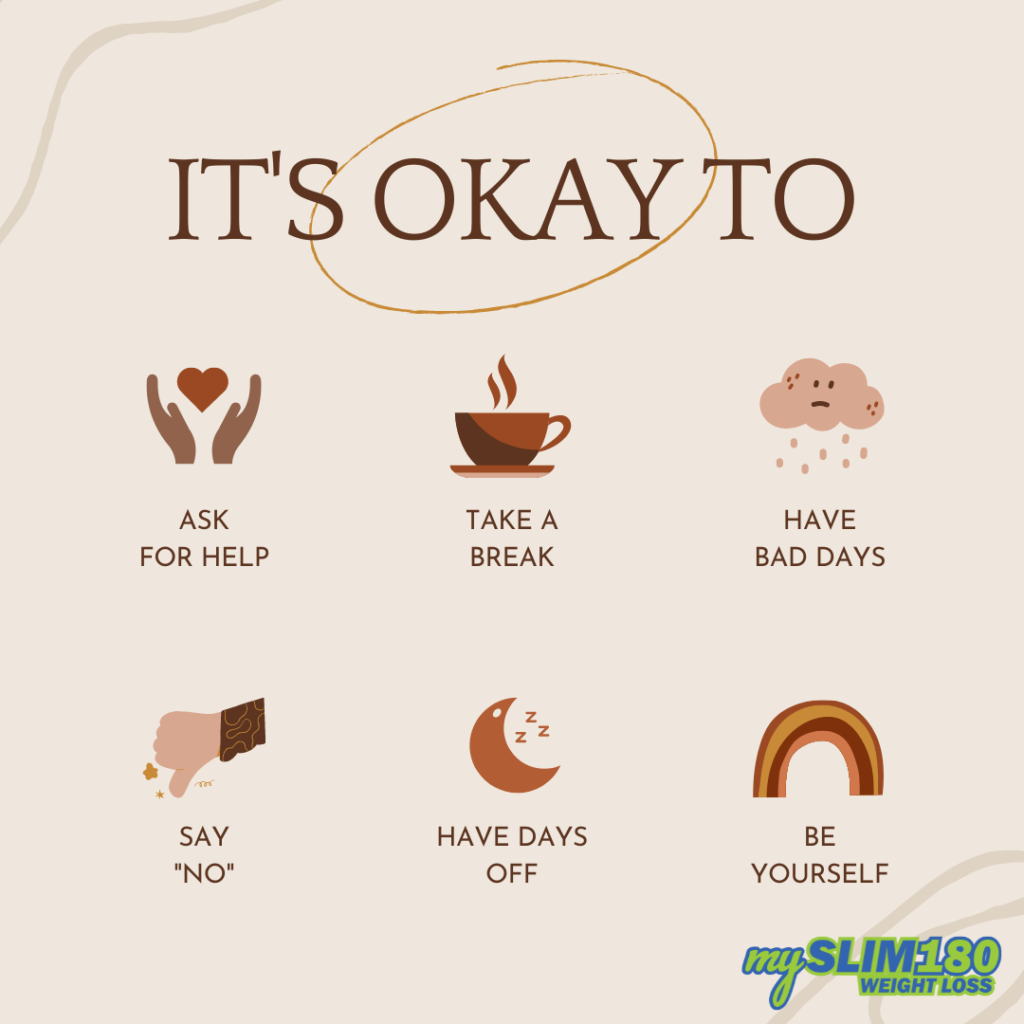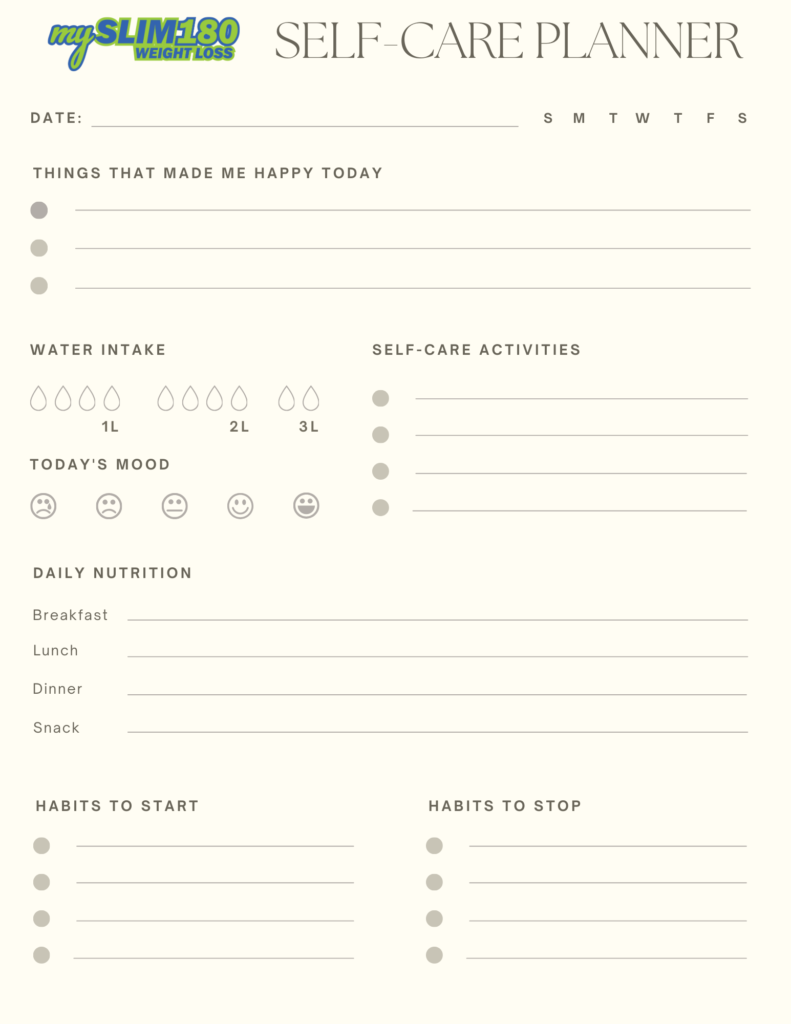What is self-care?
In the quest for shedding pounds, many people focus only on rigorous diet regimens and demanding workout schedules, often overlooking a vital element of their health: self-care. Self-care involves the behaviors and routines we embrace to support and nurture our mental, physical, and emotional well-being. It’s a comprehensive method emphasizing self-awareness, stress control, and overall health.

What is the mind & body connection?
The mind-body connection refers to the interdependent relationship between our mental, physical, and spiritual well-being. It recognizes that these aspects of our being are interconnected and influence each other in profound ways. Regarding weight loss, nurturing this mind-body connection can be highly beneficial. Here’s how it helps:
Mental and Emotional Well-being:
Slim180 understands that the mind-body connection plays a significant role in weight gain or loss. Developing a positive mindset, self-awareness, and emotional resilience can be invaluable during the challenges of weight loss. It also allows for the nurturing of self-compassion, effective stress management, and the recognition and addressing of emotional eating patterns or unhealthy habits.
Mindful Eating:
Developing a strong mind-body connection is crucial for fostering mindful eating habits. Mindful eating mandates complete attention to the present moment, relishing every morsel of food, and being in tune with hunger and fullness cues. This heightened awareness empowers individuals to consistently make healthier choices, fully enjoy their meals, and cultivate a more instinctive and balanced approach to nourishment. The practice of mindful eating is instrumental in aiding weight loss efforts by enforcing portion control, mitigating emotional eating, and bolstering overall dietary habits.
Physical Well-being:
The mind-body connection acknowledges the significant impact of physical well-being on our overall health and weight. Regular physical activity, such as exercise, not only helps with weight loss by burning calories but also releases endorphins, improves mood, and boosts energy levels. Taking care of the physical body through proper nutrition, hydration, and rest is crucial for sustainable weight loss. When the body is nurtured and supported, it operates optimally and contributes to overall well-being.
Spiritual Alignment:
Nurturing the soul aspect of the mind-body connection involves firmly connecting with one’s values, purpose, and inner self. This spiritual alignment empowers individuals with the motivation, clarity, and resilience needed during their weight loss journey. By aligning weight loss goals with deeper values and finding meaning in the process, individuals will stay committed, make healthier choices, and embrace sustainable lifestyle changes that support their overall well-being.
Long-term Lifestyle Changes:
The key to sustainable weight loss lies in embracing long-term lifestyle changes that support the mind-body connection. It’s crucial to prioritize nurturing your mental, physical, and spiritual well-being, as this fosters holistic habits that promote overall health and effective weight management. This shift in mindset fuels a strong commitment to self-care, self-empowerment, and self-love, all of which are essential for maintaining long-term weight loss results.
Let’s talk about the connection between Self-Care & Weight Loss
The connection between self-care and weight loss is frequently overlooked but is essential for achieving sustainable and successful outcomes. Practices play a significant role in supporting and complementing weight loss efforts by addressing the underlying factors that contribute to weight gain and unhealthy habits.
Self-care plays a crucial role in promoting self-awareness.
Self care plays a crucial role in promoting self-awareness, allowing individuals to understand their emotional and psychological triggers related to food and eating. By embracing mindfulness and self-reflection, individuals can gain insight into their relationship with food, identifying any patterns of emotional eating or habits driven by stress, boredom, or other factors. This awareness empowers them to make deliberate choices and develop healthier coping mechanisms, reducing their reliance on food for emotional comfort.
What else??
Furthermore, self-care encompasses stress management techniques that assist individuals in dealing with the everyday pressures and challenges that can give rise to unhealthy behaviors and hinder progress in weight loss. Chronic stress triggers the release of cortisol, a hormone linked to increased appetite and fat storage. By incorporating stress-reducing activities such as exercise, meditation, deep breathing exercises, or engaging in hobbies, individuals can effectively manage stress levels, reduce cortisol production, and create a more balanced internal environment conducive to weight loss.
Remember this:
Self-care must encompass self-compassion. Weight loss journeys are tough, and setbacks or plateaus are expected. Practicing self-compassion means treating yourself with kindness, understanding, and forgiveness. Instead of self-criticism or negative self-talk, embrace your progress, celebrate small victories, and view setbacks as opportunities for growth. This positive mindset will help you maintain motivation, resilience, and a long-term commitment to healthy lifestyle changes.

Benefits of self-care for weight loss
Self-care has numerous benefits for weight loss. Here are some key advantages of integrating self-care into your weight loss journey:
Improved Emotional Well-being:
Self-care practices are powerful tools for promoting emotional well-being. They directly address underlying emotional triggers and effectively reduce stress. This proactive approach can prevent emotional eating, a common barrier to weight loss. By confidently managing emotions and stress levels, individuals can cultivate a healthier relationship with food and consistently make mindful choices. Keep up the positive momentum!
Enhanced Self-Awareness:
Engaging in self-care activities fosters self-awareness, allowing individuals to identify their body’s needs, hunger cues, and emotional triggers related to food. This awareness empowers them to make conscious choices that align with their weight loss goals, leading to healthier eating habits and portion control.
Sustainable Lifestyle Changes:
Prioritizing self-care, which focuses on making long-term lifestyle changes rather than short-term, restrictive approaches. By embracing self-care, we develop sustainable habits such as regular exercise, balanced nutrition, and adequate sleep. These habits not only support weight loss but also contribute to our overall health and well-being.
Stress Management:
Dealing with ongoing stress can make it harder to lose weight because it can lead to higher levels of cortisol in the body, which can make it easier to store fat and mess with your appetite. However, taking care of yourself by doing things like exercising, meditating, and practicing relaxation techniques can help keep your stress levels in check, lower your cortisol levels, and create a more supportive atmosphere for weight loss.
Enhanced Self-Compassion:
Remember to be kind to yourself during your weight loss journey. Self-compassion can help you stay motivated and positive while also being resilient in the face of setbacks.
Increased Energy and Vitality:
Engaging in self-care practices like consistent physical activity, sufficient sleep, and a balanced diet supplies the body with essential energy and nutrients for optimal functioning. Prioritizing self-care leads to higher energy levels, better mood, and increased vitality, which in turn facilitates the ability to participate in physical activities and maintain healthy routines.
Long-Term Weight Maintenance:
Sustainable weight loss involves maintaining a healthy weight over the long term rather than just shedding pounds. Self-care practices aim to take a balanced and holistic approach to weight management, addressing both physical and emotional aspects. Incorporating self-care into daily life helps individuals develop the skills and habits needed to sustain their weight loss achievements over time.
Eco-friendly weight-loss tips
When it comes to holistic self-care, it’s essential to consider not only personal well-being but also the well-being of the environment. If you’re interested in incorporating eco-friendly practices into your weight-loss journey, here are some tips to help you achieve both goals:
Sustainable Eating:
Consider adopting a plant-based diet or integrating more plant-based meals into your eating habits. Research suggests that plant-based diets are linked to lower carbon footprints as opposed to diets high in animal products. It is advisable to opt for locally sourced and organic produce whenever feasible to promote sustainable agriculture and minimize the environmental effects of food transportation.
Mindful Meal Planning:
We understand the importance of minimizing food waste and how it can contribute to sustainable practices. Planning your meals in advance, taking inventory of what you already have, and creating a shopping list based on your needs can make a real difference. It not only helps reduce food waste but also saves money.
Choose Sustainable Protein Sources:
When consuming animal products, opt for sustainable sources like organic, grass-fed meat or sustainably caught fish. Decrease your intake of processed meats and confidently incorporate alternative protein sources such as legumes, nuts, and seeds into your diet.
Reduce Packaging Waste:
Remember to bring your own reusable bags when grocery shopping and choose products with minimal or recyclable packaging. When possible, buy in bulk to minimize packaging waste. Use reusable alternatives instead of single-use plastics, such as water bottles and disposable utensils.
Engage in Outdoor Exercise:
Ditch the indoor gyms and fitness equipment and make the most of the great outdoors for your workouts. Embrace nature with invigorating hikes, leisurely walks, or exhilarating bike rides. This approach not only enhances your physical well-being but also strengthens your bond with the environment and encourages sustainable fitness habits.
Practice Active Transportation:
Make sure to incorporate active transportation into your daily routine whenever possible. Choose walking or cycling for short distances instead of relying on vehicles to reduce carbon emissions and improve personal fitness.
Waste Reduction:
Incorporating waste reduction practices into your weight-loss journey is a great way to minimize your environmental impact. You can start by using reusable water bottles, food containers, and utensils. Opt for sustainable alternatives to single-use items, such as cloth napkins instead of paper ones. Additionally, composting food scraps and recycling packaging properly are also important steps toward reducing waste.
Connect with the outdoors:
Enjoy spending time outdoors and connecting with nature. You can immerse yourself in gardening, go for a hike, or unwind in green spaces. This connection with nature is great for your mental well-being and helps you appreciate and protect the environment.

Strategies for sustainable weight loss
When aiming for weight loss, it’s important to implement sustainable strategies to achieve lasting results. Here are a few sustainable approaches:
- Set Realistic Goals: Set achievable and realistic goals that align with your individual needs and capabilities. Avoid extreme or crash diets that promise quick results. Instead, focus on making gradual and sustainable changes to your eating habits, physical activity, and overall lifestyle.
- Create a Balanced Eating Plan: For a healthier approach to eating, it’s best to follow a balanced and nourishing eating plan that includes a wide variety of whole foods. Make sure to include plenty of fruits, vegetables, whole grains, lean proteins, and healthy fats in your meals. Strive for moderation rather than strict deprivation and allow yourself occasional treats to maintain a sustainable approach.
- Practice Portion Control: It’s important to be mindful of portion sizes to avoid overeating. Using smaller plates and bowls, practicing mindful eating, and being attentive to your body’s hunger and fullness signals can help. Slowing down while eating and savoring each bite can also help you feel satisfied with smaller portions.
- Prioritize Physical Activity: Don’t forget to make time for physical activity that you love. Try to do things that suit your lifestyle and interests, like taking walks, swimming, dancing, or cycling. Shoot for at least 150 minutes of moderate-intensity exercise or 75 minutes of vigorous exercise each week, and don’t forget to include some strength training too.
- Focus on Consistency, Not Perfection: Consistency is crucial for sustainable weight loss. Instead of striving for perfection, concentrate on making healthy choices consistently. Give yourself flexibility and use setbacks or slip-ups as opportunities to learn rather than seeing them as failures. Embrace the journey as a learning process and remain dedicated to your long-term goals.
- Practice Mindful Eating: Remember to be mindful of your eating habits and listen to your body’s signals. When eating, take your time, appreciate the flavors, and avoid distractions. This approach can assist you in building a healthier connection with food, enhancing your mealtime experience, and identifying genuine feelings of hunger and fullness.
- Find Support and Accountability: Rely on the support of friends, family, or a weight loss support group. A strong support system can provide the motivation, encouragement, and accountability you need. Also, consider working with a qualified professional who can guide you through your weight loss journey.

Low-cost Self-Care tips that won’t break the bank!
Engaging in self-care can be achieved without incurring substantial expenses. Below are cost-effective self-care strategies aimed at facilitating your weight loss journey:
- Outdoor Activities: Don’t miss out on the opportunity to leverage the great outdoors for physical activity. Walking, jogging, hiking, or cycling in your local park or neighborhood are cost-effective methods to engage in physical exercise and expend energy. Furthermore, the natural environment offers a revitalizing and invigorating setting for your personal wellness regimen.
- Home Workouts: Don’t forget about all the amazing free workout resources available online. You can find a wide variety of workout routines on fitness websites, YouTube channels, and mobile apps. These workouts don’t require expensive equipment or gym memberships, so you can easily do them at home. Whether you’re into bodyweight exercises, yoga classes, HIIT workouts, or something else, there’s something out there for everyone, regardless of your preferences and fitness level. Have fun exploring and getting active!
- Meal Planning and Cooking at Home: Planning your meals ahead of time can be helpful in saving money and making healthier choices. By creating a weekly meal plan with affordable, nutrient-dense ingredients, you can take control over your portion sizes, ingredient quality, and preparation methods, which is great for nourishing your body while managing your budget.
- Embrace Whole Foods: It’s important to prioritize incorporating whole foods into your diet, including fruits, vegetables, whole grains, legumes, and affordable sources of lean protein like eggs, beans, and canned tuna. Whole foods are not only more budget-friendly but also packed with essential nutrients compared to processed or convenience foods.
- Utilize Free Fitness Resources: Discover the amazing free or low-cost fitness options available in your community! Local parks, community centers, and schools offer a wide range of exciting fitness classes, including yoga, Zumba, and group workouts.

